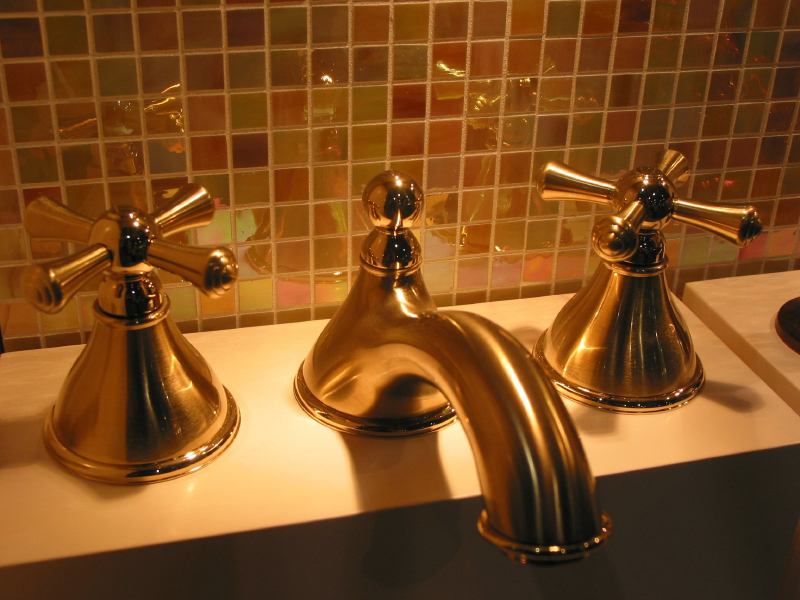Understand Your Faucet
 A leaky faucet is not just annoying: It can also stain your sink or tub and waste thousands of gallons of water. Luckily, a leaky faucet is also easily prevented. Choose a reliable faucet at the outset, so you’ll be less likely to encounter problems with your hardware. Whether you are planning a remodel, replacing a broken faucet or freshening up the look of your kitchen or bathroom, make a decision based on more than looks and price.
A leaky faucet is not just annoying: It can also stain your sink or tub and waste thousands of gallons of water. Luckily, a leaky faucet is also easily prevented. Choose a reliable faucet at the outset, so you’ll be less likely to encounter problems with your hardware. Whether you are planning a remodel, replacing a broken faucet or freshening up the look of your kitchen or bathroom, make a decision based on more than looks and price.
Mechanically, there are four types of faucets: compression, cartridge, ball, and disc. Each has a different mechanism for controlling water flow; some work better than others and some are more durable. All are relatively easy to fix if a washer, seal, O-ring, or cartridge needs replacement and starts to leak or drip. Find out the details so you can hire a plumber to install the best type for you.
Compression Faucet
Compression faucets are the least expensive type, most often found in older homes, in the bathroom, kitchen, and laundry room. They are still available for purchase, but because of the maintenance required, they are no longer as common as they used to be. You can tell you have a compression faucet if there are separate knobs for hot and cold water, which work when you twist them to either open or shut the water flow.
Compression faucets will, at some point, drip. They utilize rubber seals or washers that will eventually wear out and need to be replaced. These seals are located at the end of a compression stem that stops the water flow when the handles are tightened. When the seal or washer deteriorates, water gets past it and causes a leak. The good news is that even a novice can replace a faucet seal.
The other 3 types of faucets are "washerless." Most experts would recommend a washerless variety as better value, because they tend to leak much less than compression faucets.
Ball Faucet
A ball faucet, commonly used in kitchen sinks, has a single lever controlling a slotted ball that aligns with the cold and hot water. Regulate the water pressure by raising the lever, which lifts the ball to let the water through. The temperature is adjusted by moving the lever from side to side. This aligns chambers in the ball that mix hot and cold water. A ball faucet with its numerous parts is the leakiest of the washerless faucets.
Cartridge Faucet
A cartridge faucet contains a hollow metal cartridge that seals the faucet, controlling water flow and temperature. Equipped with either one or two handles, it is typically found in bathrooms and kitchens. A single handle works by being pulled up or down to adjust water pressure and moved back and forth to adjust temperature. A double-handle cartridge faucet works much like a compression faucet, but you don't have to apply force to turn it off and on, making it easier for young children and people with arthritis to use. The cartridge contains all the parts that are subject to wear, so a leak or drip is a sign that a cartridge needs to be replaced. Many manufacturers offer a limited warranty, as the quality of these faucets is generally very good.
Ceramic Disc Faucet
Last -- and certainly not least -- is the ceramic disc faucet, the latest in faucet technology and the most reliable. This faucet controls water flow and temperature with two fire-hardened ceramic discs: one stationary and one that moves sideways or up and down. Regulate the discs by turning the handles on a double-handle faucet or raising the lever on a single-handle faucet. The movement causes a mobile disc to move across a second, stationary, disc. Disc faucets tend to have a wide body to house the discs, which are located inside a cartridge. Used in kitchens and baths, they’re considered the most reliable faucet types; the cartridge rarely needs replacement. Not surprisingly, they are also the most expensive and often come with lifetime cartridge guarantees.
This article was updated November 13, 2017.
Looking for a Pro? Call us (866) 441-6648

Plumbing Average Costs
Plumbers Experiences

A Modern, Nice-looking Bathroom Remodel Also Adds Value To Our Home

Replacement Water Heater For Our Condo At The Lake



